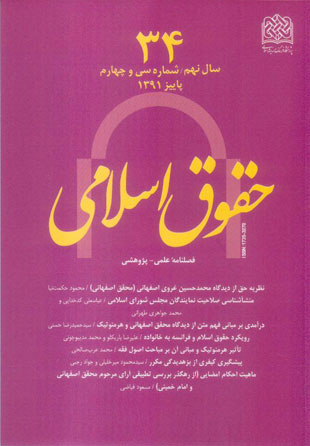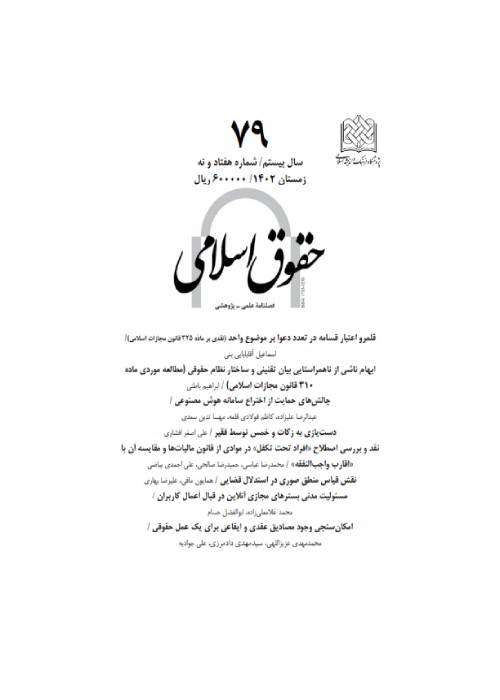فهرست مطالب

فصلنامه حقوق اسلامی
سال نهم شماره 3 (پیاپی 34، پاییز 1391)
- بهای روی جلد: 60,000ريال
- تاریخ انتشار: 1391/09/14
- تعداد عناوین: 7
-
-
صفحه 37
-
صفحه 167
-
صفحه 193
-
Page 7The issue of Right is one of the fundamental elements in every legal system including Islamic legal system. Ayatullah Muhammad Hussein Esfahani is among the researchers, who has independently and implicitly investigated the various aspects of the issue in his juridical discussions. This article tries to investigate the philosophical and legal aspects of this system from his viewpoint. In this regard we try to consider the analysis method of the issue by finding out the central theme of the Right and its being. In addition, the principles and provisions in the matter of Right such as law enforcement of a right, capability of relinquishment of a right, transferability of a right, capability of transition of a right, inseparability of a right, possibility of plurality of a right and voidness ofpossessions trampling a right are going to be evaluated.Keywords: the Right, dominant principles on right, provisions of right, methodology of right
-
Page 37In explanation of the origin of competencies of the members of the Islamic Parliament was usually referred to the liberal traditional views, i.e., the theory of delegation granted by people to the members of parliament. Nevertheless, since legal effects and consequences of the above idea were inconsistent with the foundations of the Islamic political thought and because of the essential difference between the Islamic system and ordinary governments, question of the origin of the competency of the members of parliament seems to be an important question which needs to be studied anew. While re-studying and criticizing common views about the origin of competency of the members of parliament, in the present article applicability of the legal status of wali-e-faqih to the Parliament in the constitutional conext has been accepted and emphasized as the chosen view.Keywords: political delegation, representative, political representation, public official
-
Page 71An important part of the discussions in Jurisprudence (Usul) are quite hermeneutic in essence; and there is a deep connection between them and the discussions on the ''hermeneutics of the text''. The juridical provisions concerning the understanding and deducing the Holy Scriptures (the Book and the Sunnah) are derived from the common law dominating on understanding of the text which have been discussed in Jurisprudence due to their ongoing nature and dominating nature on the "understanding of the human-created text". The aforementioned discussions justify the reason for conducting comparative studies in this regard. This article aims at investigating the effective elements on the understanding of the text in Jurisprudence from the juridical viewpoints of the eminent scholar Sheikh Muhammad Hussein Esfahani in comparison to viewpoints of some of the outstanding Hermeneutists. In this article, in addition to explain the text model from the viewpoint of the researcher Esfahani, we are going to deal with the role of the text, author and commentator on understanding of the text. Meanwhile, we will consider determining of the text meaning, the status and role of the author in understanding the text and also interpretative comment of the researcher Esfahani. And finally a comparison will be conducted between the Muhaqiq Esfahani's view and views of some of the Hermeneutists such as Schleiermacher, Dilthey, Heidegger, Gadamer, Ricoeur and Hirsch. Muhaqiq Esfahani believes in objectivity of the text meaning. He also holds that the interpreter must look for the author's real intention by understanding of the text meaning. In fact, he considers the text as a counselor in the sense intended by its author. Muhaqiq Esfahani and other juridical scholars both hold a high status for the author as the creator of the text and they believe that discovering author's real meaning is the ultimate goal of text understanding, and they revere to the text status as something objective carrying the message of the creator and the only way to achieve his intended meaning and look for discovering exoteric meaning of the text at the time of its creation, and at the same time regard the status of commentator, a person who looks for the author's intended meaning by adopting the customary method of mutual understanding, application of linguistic principles, and not imposing his subjectivities on text.Keywords: Hermeneutics, Jurisprudence, Muhaqiq Esfahani, Schleiermacher, Dilthey, Heidegger, Gadamer, Ricoeur, Hirsch
-
Page 109The family as the main social institution that is formed in the light of Customs and beliefs of the nations and transformed throughout human history which today, is influenced and threatened by the process of globalization movement from some aspects, since the developments of globalization In family section, is under the influence of the feminist movement on one hand and affected by homosexuality deviations on the other hand, in addition it plans to govern the regulations based values of states which regarding to the family are suffered the most severe crisis. In this article, the approach of Islamic and French law to the Family is considered and is proved that what is resulted in practicing to the French law is a deviation from the rules of Islamic law and this conflict is Due to the differences in the approaches, aim and foundation of family law in these systems. Thus Islamic Country’s legislators should be adhering to the fundamental principles of Islamic law so to achieve their Social goals.Keywords: Family, Family aim, approach to Family, individualism, communalism, family Functioning
-
Page 139With the advent of Western Philosophy discussions in Islamic world, Islamic scholars have faced new topics in this regard. Hermeneutics is one of these sciences, which has raised lots of debates in the areas of understanding, knowledge and commentary in Islamic sciences. This article mentions only some of the debates of this area which are related to Jurisprudence. There exist questions such as whether there is a connection between these two branches of the science and or one of these fields can impact on the other or be impacted by. If assumed that the Hermeneutics is effective [on other sciences], then is it part of the Jurisprudence or is it an emerging juridical issue by itself? Among the issues being discussed in this article is how do the Hermeneutic approaches interact with the Jurisprudence or impact on. In this article after a brief explanation of the case and expressing the fundamental distinctions of the two approaches in Hermeneutics, first, a view that maintains no relationship between hermeneutics and Jurisprudence has been criticized and in the second stage, the status of the Hermeneutics in comparison to Jurisprudence and also this question whether the Hermeneutics is part of the Jurisprudence have been explained. Finally we try to consider how the two fundamental Hermeneutic approaches (i.e. Classic Hermeneutics and Philosophic Hermeneutics) independently impact on Jurisprudence.Keywords: Hermeneutics, Jurisprudence, Classic Hermeneutics, Philosophic Hermeneutics, Philosophy of Jurisprudence, methodology, resources of deduction
-
Page 167Some people may be frequently the targets of crime and experiencevictimization, while the others would not have the same fate or ultimately experience victimization one time in their life. Repeated victimization refers to re – victimization of persons, places and targets that previously have been targets of crimes. Among the factors of repeated victimization can be noted to the followings: victim does not inform the victimization and thus the offender will not receive a punishment, there is a familiar relationship between the offender and the victim, repeat victimization against the victim is easy, judicial factors and the lack of effective protection of vulnerable victims. The study aims to explain how could deal with and prevented from the causes of repeated victimization? In addition to non- criminal teaching of Islam including the obligation to trade with caution, creation a culture of anti – oppression in the society, promoting the culture of patience and tolerance, using punishment – based measures such as criminalization of a non – reported victimization and not help or support the victim, simple and differential criminal support, prediction of self – defense and criminal and civil disclaimer and the like are among proposed preventions of repeated victimization which can reduce the likelihood of repeated victimization using them.Keywords: criminal prevention, delinquency, victimization, Islamic criminal policy
-
Page 193Ratified prescripts are those divine ones which have been ongoing in the common law since before the advent of Islam. Islam has accepted and confirmed those social conventions either with no changes or by some modifications. Considering the Arab tradition since the early days of Islam has been a basis for these prescripts, the following fundamentalquestion arises: Despite the most of these conventions are obsolete totally or partially among many other nations, can it be said that these prescripts are not practical now or their non-practicality is not subject to the obsolescence of the common law of those times? The response is clear when it comes to the elements of the common law. Because in thiscase by vanishing of the common law the prescriptions are not practical any more. But the problem is where the common law is not of the constituent element of the case and it has only been a bed for realization. Because looking for a proper answer in this case depends on the decisions based on the lawgiver's signature, because if we believe that in the process of endorsement no validity given by the lawgiver and his endorsement is only a mere satisfaction of the case; by vanishing of the common law, the prescripts will not be practical and justified. But if we believe that in the process of endorsement adducing to the validity of analogous prescripts gains its validity from scholars'; the prescripts are not invalidated and are still feasible. Regarding the trueness of endorsement, Imam Khomeini (RH) believed in the first phase and the Late Ayatullah Gharavi Esfahani (RH) believed in the second phase. In this article, in addition to comparative investigation on the comments of these two thoughtful jurisprudents about the elements determining the nature of the ratified prescripts, we authenticate the Late Esfahani's comment. This comparative investigation is going to acquaint the reader with the nature of ratified prescripts the more, and indicates him the relation between the common law and divine law the better.Keywords: ratified prescript, analogous prescript, rational conduct, scholar's conduct, the common law, Gharavi Esfahani(RH), Imam Khomeini(RH)


